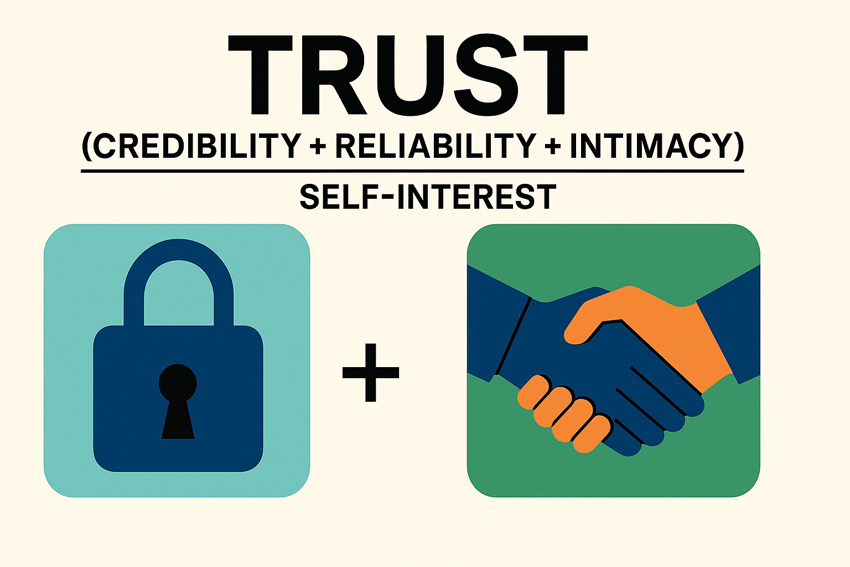The Skills Coach: Want to succeed as a new lawyer? Start with the Trust Equation
The Skills Coach: Want to succeed as a new lawyer? Start with the Trust Equation
By Lori Berman
As Vice President of Learning at Legal Innovators, I ran a newly redesigned three-week training program in September for new law school graduates who will be placed at law firms across the country. Our goal: Give these new lawyers an edge – a foundation of skills and insight that most new associates don’t start with.
We ran practical skills sessions, including substantive law seminars, an interactive corporate skills simulation, and litigation skills practice. But we married those practical skills with a focus on professional skills, especially one concept that cuts across everything else: Trust.
We spent a lot of time talking about what it means to take ownership and to build trust as a junior lawyer. One framework that helped us was the “trust equation” from the book, The Trusted Advisor, by Maister, Green, and Galford.
Trust = (Credibility + Reliability + Intimacy) / Self-Interest
We took that equation into the day-to-day world of a first-year associate. What does it look like to build trust when you’re new, eager, and still finding your footing? Here’s what we explored, and what all new lawyers should keep in mind as they start their careers.
- Credibility: More than your resume
Many new associates assume their credibility is high right out of the gate because they went to a good law school, they landed a job at a great firm, and they know the law. But inside the firm, your colleagues don’t know you yet. So, your credibility isn’t established: It’s earned.
Think about how you approach your first few assignments. Do you treat them with care and thoughtfulness? Do you submit work free of typos and errors, showing that you pay attention to detail? Do you ask good questions when given an assignment and then follow up with a clear, well-reasoned draft rather than something you just “took a crack at”?
Credibility is about showing judgment, precision, and preparation. You don’t have to know everything. But you do need to show that you know how to learn, how to think, and how to deliver work your team can count on.
- Reliability: Do what you say you’ll do
Credibility alone isn’t enough. People also need to know they can count on you. Reliability is about being consistent, not about being perfect.
Do you meet deadlines? Do you communicate early if something’s going off track? Do you follow through on small things – like submitting your time sheets, replying to emails in a timely manner, or showing up to meetings on time? These behaviors might seem minor, but they’re building blocks of trust.
And here’s the deal: If people trust you to handle small things, they’re more likely to trust you with big things.
- Professional intimacy: Building connection in a disconnected world
“Intimacy” may sound out of place in a law firm, but in the trust equation, it simply means emotional closeness. That is, being someone others feel comfortable with and want to be around, while also showing mutual respect by maintaining professional boundaries. For new lawyers, that comes down to relationship-building.
I’ve seen too many new associates who keep their heads down, buried in the billable work, and miss out on forming key relationships. With remote and hybrid work, building relationships has only gotten more difficult. Yet, trust grows through conversation, collaboration, and presence.
So, go to lunch with peers. Ask partners how they got started in their practice. Stop by someone’s office (or set up a virtual coffee) just to check in. Trust isn’t only built through your work product – it’s built through human connection.
- Self-interest: Get out of your own head
The denominator of the Trust Equation is self-interest, and that’s what can quietly erode trust, even if your credibility, reliability, and relationships are topnotch.
If your colleagues sense that you’re always angling for the best assignment, trying to impress the partner rather than support the team, or focused only on your own success, it lowers their trust, even if you’re delivering great work products. You’re not in law school anymore, where it’s all about your own success. You’re part of a team now.
So, ask yourself: Am I showing up as a team player? Am I trying to learn and contribute or just trying to look good? Am I listening to what’s needed or just doing the minimum so I can go home?
You can (and should) have ambition. But channel that ambition toward the team’s goals, not just your own.
Final thoughts
Trust is your most valuable asset as a new lawyer. It determines who gets brought onto the next matter, who gets looped into key conversations, and who gets mentored.
For all the new lawyers starting this month, remember that your “brand” isn’t just about being smart; it’s about being trusted. Every email you send, every assignment you turn in, every relationship you build is a chance to show that you’re someone people want on their team.
Because once people trust you, everything else gets easier. Trust me on that one …

Lori Berman, Ph.D., is an organizational psychologist and Vice President of Learning at Legal Innovators, a talent management solution for law firms and corporate legal departments. She is co-author of Accelerating Lawyer Success: How to Make Partner, Stay Healthy, and Flourish in a Law Firm. Reach her at [email protected].
Share this story, choose a platform
Brought to you by BridgeTower Media
Free Weekly Newsletter
Recommended content
Cybersecurity: As firms employ automation, cybersecurity is a strategic imperative
Cybersecurity: As firms employ automation, cybersecurity is a strategic imperative By Carl Mazzanti I often encounter a dangerous misconception among [...]
A law firm’s year-end financial review checklist
Even if you can’t tell a KPI from an IRA, following these three financial tips will help you avoid trouble. [...]
Where your leads are coming from (may not be where you think)
If prospective clients simply say they found your firm through “Google,” chances are it doesn’t tell the whole story. Read [...]
The non-linear path in a fulfilling legal career
“Status quo bias” – the tendency to stay on traditional, but unfulfilling, career paths – holds a powerful sway over [...]






